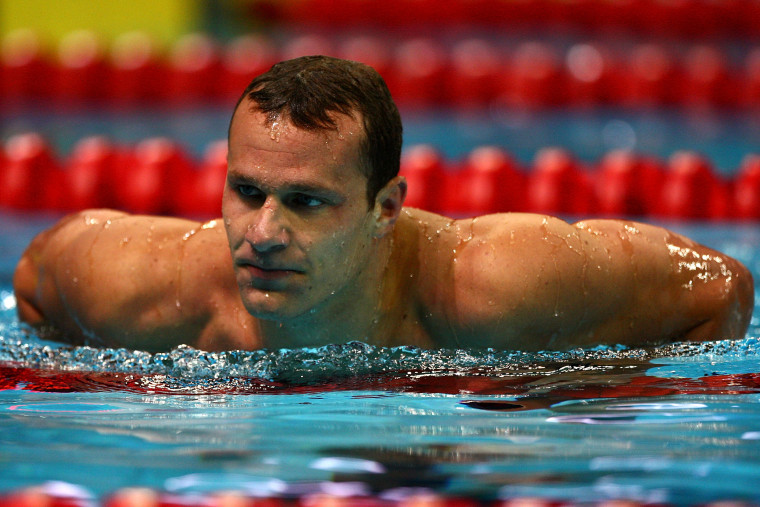Michael Phelps lived up to the hype. Dara Torres didn't act her age. Tyson Gay fell. Brendan Hansen flopped.
The U.S. Olympic swimming and track trials brought out the best in some, and exposed some problems for others. Once they were over, the U.S. Olympic Committee leaders believed, as they always have, that these pressure-packed weeks with no second chances are still the best way to choose their Olympic teams.
"It does come with challenges, such as what Tyson Gay experienced,'' said USOC chief of sport performance Steve Roush. "That's one of the drawbacks, but I think ultimately, of the 600 athletes we'll take over, the win-or-go-home atmosphere prepares them for what they're going to be faced with at the games.''
Gay's hamstring injury Saturday at the track trials, which cost him a spot in the 200-meter dash at the Olympics, provoked the most pointed questions.
USA Track and Field long has had a very inflexible system at Olympic trials. The top three finishers in each event get spots on the team. Get injured, the way Gay did in the 200, and you don't make it, even if your record over the past year, or four years, proves you are obviously one of the best in that event.
Gay, the defending world champion in the 100 and 200 meters, will not go in the 200. Some wondered if the track trials are too loaded up with qualifying heats. Many sprinters in the 100 and 200 said it was an overwhelming number of races in over 10 days.
Gay has been restricted to light workouts for two weeks and says he'll be 100 percent for the Beijing Olympics. Still, these are less-than-ideal circumstances.
"The problem is, I have yet to find another system that would work better,'' Roush said. "When you start to add subjectivity, you fear that you run into politicization and favoritism. It's much cleaner to say, 'Cross the finish line, or touch the wall first or second, and you're going.'''
Phelps did everything he was expected to at trials, making it in all five individual events he swam. That, plus three relay events will give him a chance to break Mark Spitz's record of seven gold medals.
Torres, meanwhile, at 41, served up one of the most compelling storylines of the trials, earning a spot and setting herself up to become the first U.S. swimmer to compete in five Olympics.
Hansen, meanwhile, fell flat in the 200-meter breaststroke. He was a world recordholder less than a month before trials started, but he finished fourth - the biggest upset in a meet that included nine world records and where most everything went to form.
It means he'll miss racing in the Olympics in his best event. It also speaks volumes about the swimmers who beat him and earned the two spots, Scott Spann and Eric Shanteau.
"In most sports, it's a meritocracy,'' said USOC spokesman Darryl Seibel. "The athletes who perform best on a given day qualify for the team. That resonates in our country.''
Of course, different sports have different needs.
Gymnastics, which along with track and swimming is the third Olympic glamour sport, does hand out a couple of automatic spots to top finishers after nationals and Olympic trials.
But because there's a team competition in gymnastics that doesn't exist in swimming or track, the rest of the teams are essentially chosen behind closed doors. The men have a five-person committee that looks at massive spreadsheets of results and tries to figure out what gives the team the best mix for the most events. The women essentially have a committee of one, national coordinator Martha Karolyi, who won't finalize her team until after a training camp later this month, not at a big arena, but at the Karolyi ranch in Texas.
There's also more leeway for injury in gymnastics.
Defending Olympic gold medalist Paul Hamm broke a bone in his hand at nationals and missed trials, but was placed on the team through a petition process. He must prove he's physically ready at a training camp next week. If healthy, nobody would argue that it's good to have him on the team.
Had the same sort of injury scenario happened with Gay before he had qualified for the 100 at track trials, he'd be sitting home or going only as a late entry on the relay team. The relay pool is the only place for subjectivity in track's selection process; it's a limited number of athletes who didn't otherwise qualify and aren't eligible for individual events.
Track officials stand behind their injury policy, however.
"What you'd end up having is athletes perhaps in other events feigning injuries to gain access,'' USATF president Bill Roe said. "So you can't really take injury into account. I don't think that's one of the criteria we'd use in any case.''
